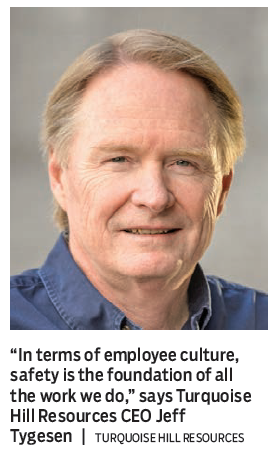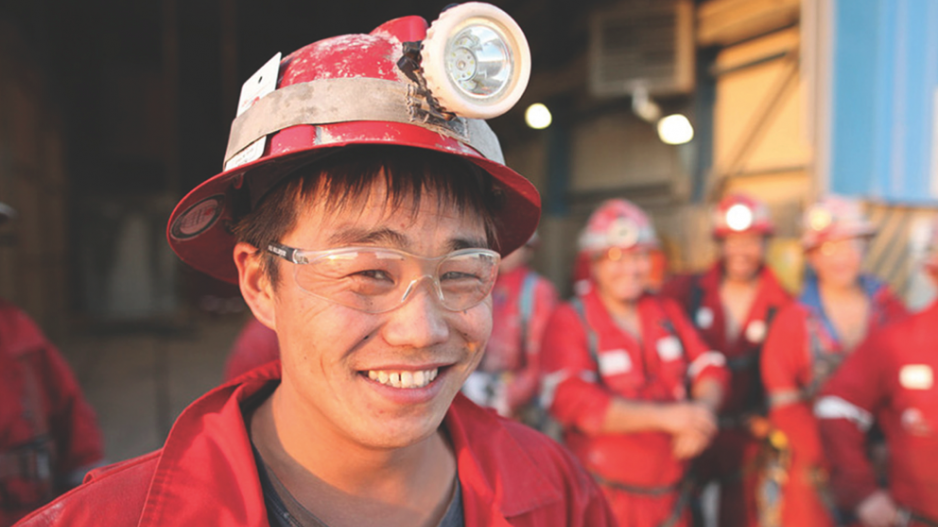PricewaterhouseCoopers' (PwC) recently released annual report on the state of the B.C. mining industry painted a picture of a sector going through a serious rough patch.
Gross revenues dropped from $8.5 billion in 2013 to $8.2 billion last year. Net income came in at $288 million, down from $1.4 billion in 2013, caused by a drop in prices for key metals – particularly coal – produced in B.C.
Spending also dropped as capital expenditures fell from $1.8 billion in 2013 to $1.5 billion last year. Yet the PwC report, titled Proving resilient, put a positive spin on the industry’s challenges, showcasing a sector doing what it could to weather the storm.
In the case of Vancouver-headquartered Turquoise Hill Resources (Nasdaq:TRQ), which operates the Oyu Tolgoi mine in Mongolia and tops Business in Vancouver’s list of B.C.’s fastest-growing companies, a key to staying financially healthy is to have a long international reach.
When the Oyu Tolgoi mine reaches full production, it is expected to be the third-largest copper-gold mine in the world. Chief executive officer Jeff Tygesen noted his company’s revenue was US$1.7 billion last year and that being successful in a volatile market means going where the money is.

“The mine’s location is strategically important because China is the world’s largest consumer of copper,” Tygesen said. “Production from the open pit started in 2013. We expect to begin construction of the underground mine, which is where approximately 80% of Oyu Tolgoi’s value resides, in 2016.”
In 2014, Oyu Tolgoi mined approximately 77 million tonnes of material and treated approximately 28 million tonnes of ore in the concentrator. The mine also produced 148,400 tonnes of copper and 589,000 ounces of gold in concentrates last year alone. Tygesen said when first production from the underground portion of the mine starts in 2021, Oyu Tolgoi will assume colossal stature within Mongolia’s economy.
“Oyu Tolgoi is expected to represent about 30% of Mongolia’s GDP when the mine is fully developed,” he said. “Over 95% of the mine’s employees are Mongolian.”
Originally founded in 1994 as Indochina Goldfields, in June 1999 the company changed its name to Ivanhoe Mines. After Rio Tinto (Nasdaq:RIO) became a majority owner of Ivanhoe Mines in 2012, the company changed its name to Turquoise Hill Resources in August 2012. It owns 66% of the shares in the Oyu Tolgoi project; the remaining shares are owned by Erdenes Oyu Tolgoi LLC, representing the government of Mongolia.
Tygesen said that through all the name and leadership changes, one thing has remained constant – a commitment to safety in an industry that regularly ranks as one of the deadliest in the world.
“In terms of employee culture, safety is the foundation of all the work we do. We want the mine’s workforce to return from work safely each and every day. Sustainability is also a key part of our culture – be it the environment or business practices. We strive to be a good neighbour and member of the communities where we operate.”
Tygesen said Turquoise Hill Resources also pays careful attention to management of one of nature’s most critical resources, and one also generating a lot of headlines as of late.
“With Oyu Tolgoi’s location in the Gobi Desert, water is a critical factor,” he said. “The mine has an extensive recycling program and in 2014 recycled approximately 85% of the water used in operations. Oyu Tolgoi’s main water source is from a deep aquifer that does not meet drinking-quality water standards. The mine also has an official well restoration and monitoring program that is conducted in partnership with local herders.”
Oyu Tolgoi was named the country’s “best responsible mine” by the Mongolian Mining Journal last year. The award recognized Oyu Tolgoi’s transition from construction to full-capacity operations by “placing safety above all else,” Tygesen said. •




